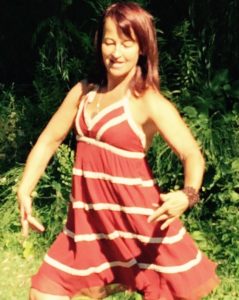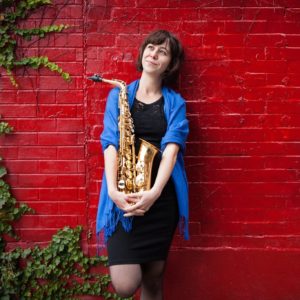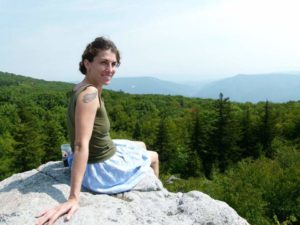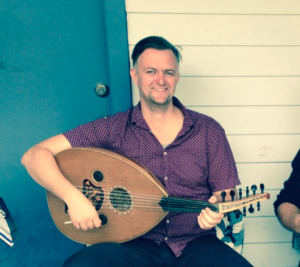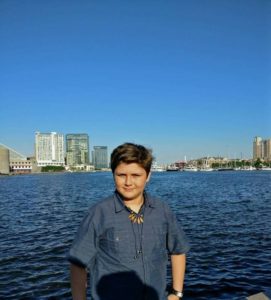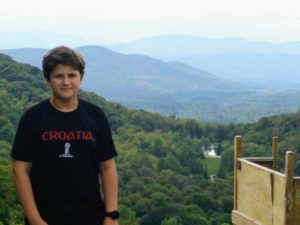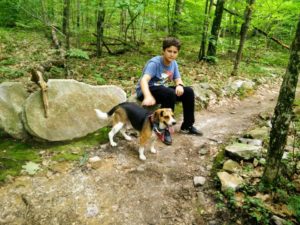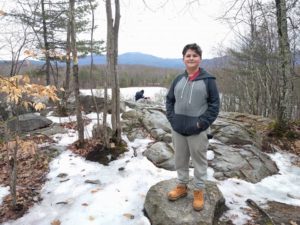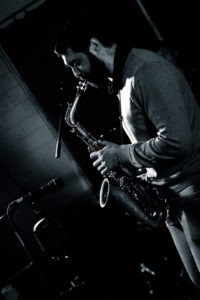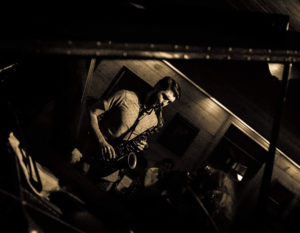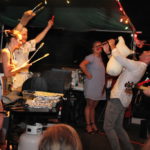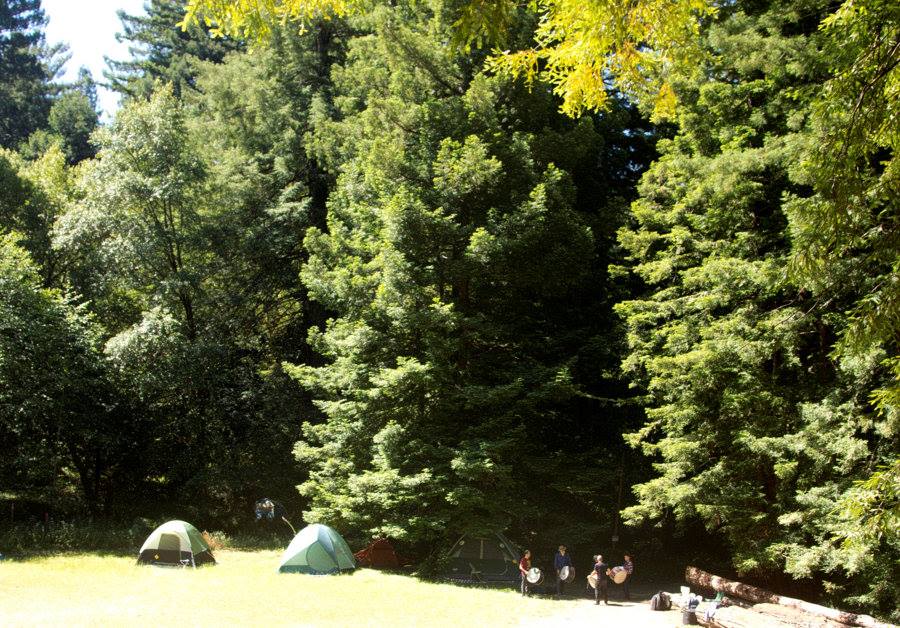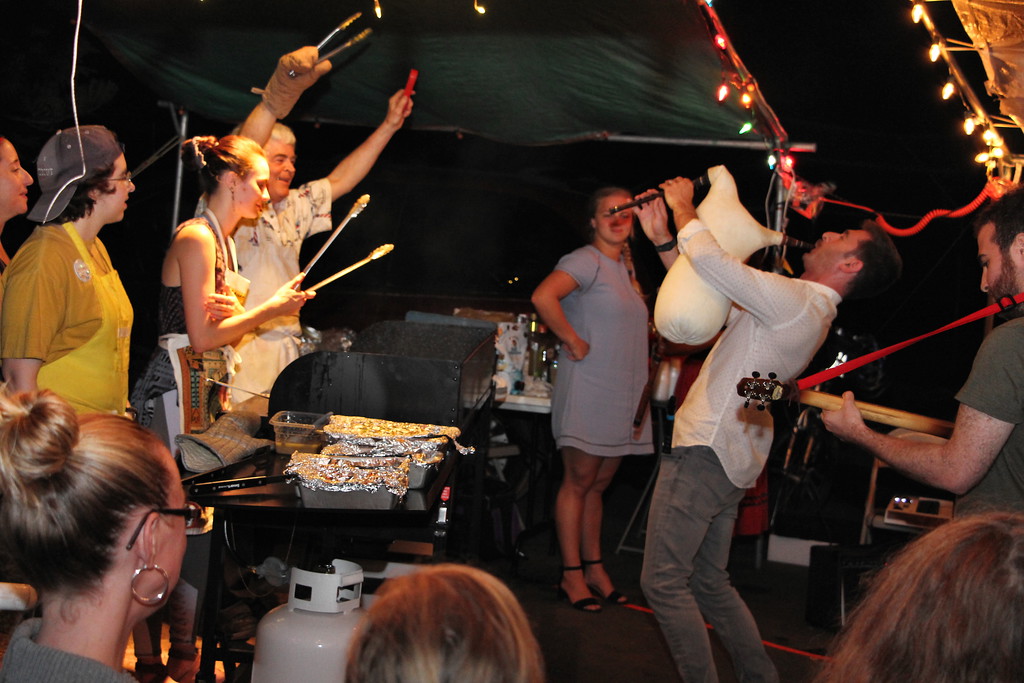
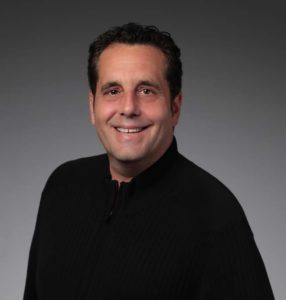
John Morovich
Whether leading a tamburica[1] ensemble in the kafana, trading licks with another musician at a picnic table, or assembling an impromptu group to perform Emil Cossetto’s immortal Ladarke suite in the dance hall, John Morovich is a vibrant presence at Balkan camp. Having grown up surrounded by Croatian music in Seattle, he has taught classes in Croatian singing, klapa and/or tamburica ensemble at EEFC camps since 1987.
John Morovich’s ancestors (his dad’s parents and his mom’s grandparents) moved to the U.S. from Dalmatia, a region on the Adriatic coast of Croatia, and settled in the Seattle area. The neighborhood his mom grew up in had so many Croatian residents that it was called “Ich-ville” because of the prevalence of last names ending in “ich.”
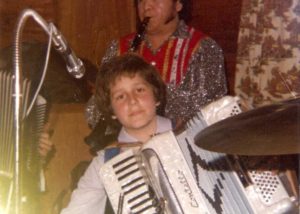
John in an early performance.
When John was growing up, there was always Croatian music around: at family gatherings, folk dancing to recorded music; at community events, performances by the Seattle Junior Tamburitzans (SJT)—a youth group that would later play a big role in John’s life. His mother, Cathryn, was a singer (she still sings). She sang and recorded with a band that played European folk music. John’s paternal grandmother was the family’s main link to the old country, teaching John and his younger sister, Joanne, songs and traditions, and speaking Croatian to them, which their parents encouraged.
John loved music. His cousin, Andy Mirkovich, was a professional accordionist and gave John his first accordion. His parents asked if he’d like to take lessons. He said, “Sure, why not?” and soon was studying with his cousin’s professor, Joseph Spano. He didn’t like the standard repertoire that beginning accordionists were expected to learn, though.
“It was really corny,” he says. “I said, ‘I want to play our music.’” While continuing his formal studies with Joseph Spano, he started teaching himself Croatian folk music by ear. Within a couple of years, he was performing in both arenas: perfecting the standard student repertoire for youth competitions, and playing Croatian music in community settings.
In 1974, at 9 years old, John was invited to perform as a guest musician at an SJT show. That’s the first time he remembers hearing tamburica music live. He liked it. At that same show, another guest performer was Macedonian singer Dragi Spasovski who had recently moved to Seattle; John liked his music as well.
Learning instruments
When John was in seventh grade, he joined SJT. The director, Thomas Krmpotich, Jr., was a master tambura[2] player and worked with John to teach him prim (the smallest tamburica instrument), along with the general musical and dance instruction all SJT members underwent. John eventually shifted to some of the other instruments, brač, then čelo and, over some years, gradually learned how to play all the different instruments in the ensemble. He also played accordion, tambura or bass guitar with the band his mother sang in.
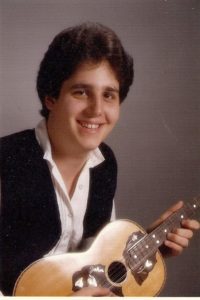
Up-and-coming brač player.
Around the same time, his family attended a summertime Slovenian picnic. “My dad had put my accordion in the trunk in case there might be an opportunity for me to play,” he says. “One old Slovenian man was so moved by my music, he took off his baseball cap and put it down between my legs and people started throwing money in there. I came home with, like, 150 bucks, and said to myself, ‘I think this is a good reason to pursue this music.’”
The traditional tamburica orchestra is made up of stringed instruments, and some experts turn up their noses at the inclusion of any other instruments with a tamburica ensemble. But, particularly in Western Washington, John points out, many Croatian immigrants were from the Dalmatian/Adriatic coast or, the Gorski Kotor region, which borders Slovenia near Italy—a triangle of land where Slovenia, Italy and Croatia come together—and people there played accordion with their tamburica music.
“Actually, you have all kinds of combinations with a tamburica band,” John says. “Playing accordion worked to my benefit, because I was able to play a job by myself with accordion, or play tambura or accordion with the band.”
In 1981, John and his sister Joanne got to tour what was then Yugoslavia with SJT; in fact, the whole family went along. They saw sights and met relatives they’d never known. John bought songbooks and records. He and his sister, excellent as they were in their Spanish language studies back home, had trouble picking up the Croatian language they were hearing. They realized that what had stuck from listening to their grandmother was mostly “kitchen Croatian”—literally, things around the kitchen and some basic conversational terms; they didn’t understand much of what was being discussed around them now. John resolved to start studying the language.
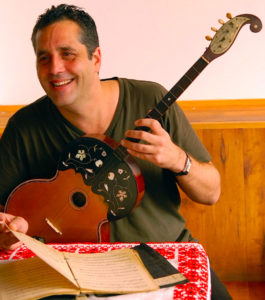
(photo credit: Mendocino Folklore Camp)
Branching out
In preparation for that trip, John and some of the other guys playing for the dance sets with the Tamburitzans—they were 17, 18, 19 years old—decided to start a regular tamburica band on the side. The other members were George, Tom and Tim Jovanovich and Jeff Suhadolnik. They all sang and played. Dubbing themselves the Sinovi Tamburitza Orchestra (sinovi means “sons”), they were soon playing for community picnics and dances and weddings throughout the Pacific Northwest as well as at Tamburitza Extravaganza—an annual festival that moves from city to city, produced by the Tamburitza Association of America. Sinovi is now in its 39th year and includes George’s son Nick and Tom’s son Jake.
After John graduated from the Seattle Junior Tamburitzans, he joined Vela Luka Croatian Dance Ensemble and Ruže Dalmatinke , a semiprofessional ensemble located in Anacortes, 80 miles from Seattle. There he had the opportunity to work with professional choreographers and teachers from Europe, and was a featured performer, including in such prestigious settings as at the Rededication of the Statue of Liberty in 1986 and for the Washington State Centennial Celebration in 1989. The group toured Croatia three times.
Experiencing Balkan camp
One night in 1986, Sinovi was playing in Eugene, Oregon, where Mark Levy, founder of the week-long Balkan Music & Dance Workshops, had recently moved with his wife, Carol Silverman.
“Mark came up, introduced himself and said, ‘We’re looking for someone to come to Balkan camp to teach tamburica,’” John says. “I said, ‘Where is it?’ And he said, ‘Mendocino, Calif., and Buffalo Gap, W.V.’ I didn’t know where those places were, but I said, ‘Well, okay, why not?’”
The next summer, at the age of 22, John taught at his first Balkan camp. Since then he has taught on the East Coast about a dozen times, and more frequently on the West Coast.
“I was blown away by the people that were there,” he says of that first workshop. “Particularly the staff, who really had an impact on me as a teacher and as a researcher. People like Carol Freeman, Carol Silverman, Mark Forry, Mark Levy, Miamon Miller, Lauren Brody and Michael Alpert—all these incredible people. These were people that were American-born but were going over to Europe and were doing fieldwork and looking for the oldest and most authentic repertoire.”
The tamburica ensembles John knew were playing music that had long been standardized, with sheet music printed in Pittsburgh or Zagreb, with dance choreographies based on what the national ensembles were doing. In contrast, the teachers at Balkan camp were learning Balkan languages and conducting original research. It seemed to John that that kind of scholarship was exactly what the Croatian community needed, and he realized that he could do it—in fact, that he needed to do it.
Most of the Balkan camp staff members were 10 years older than John and had quite a bit of work under their belts already. They encouraged him, handing him cassette tapes of styles of music that were completely new to him. They introduced him to techniques of collecting traditional music, songs and dances, going to the oldest sources and getting field recordings.
“It was a lot more difficult to find things back then,” he says. “You really had to search high and low. Now you can just type a few words into Google and boom, everything pops up. Although you have to have a little bit of a starting point. It can be difficult if you don’t speak that dialect because folk songs are not written in literary Croatian, Serbian, Bosnian, etc.; they’re written in the dialect of that village. If you don’t know that dialect, you really need to go to a person from there.”
He also got even more serious about learning the language.
“Now I’m fluent,” he says. “It took me a while to do it. It’s good for business, too. Because when you’re playing a gig somewhere and you’re a musician, it’s important to know if somebody’s requesting a song or wants to buy you a beer. If you also know where your audience is from, then you’re going to know what songs to play for them. There are a lot of regional songs in the Balkans and it’s great to know songs from a person’s particular little microregion.”
Working a day job
After graduating from high school, John attended a local community college and worked full time in retail clothing sales. Wanting to make a career change after 15 years in retail, John attended the Art Institute of Seattle and graduated with a degree in audio production/sound engineering, with a focus on live sound reinforcement for acoustic instruments. His first job out of college was at Seattle’s Museum of History and Industry, where he was house engineer for the theatre. To this day he still loves to do live sound for acoustic instruments, particularly for Balkan music, but after the museum job ended about five years ago he went to work for a catering company.
Today he is a senior sales associate and event coordinator for that company. Arista Catering does corporate catering for law firms and tech companies, including Amazon and Facebook, in Seattle’s South Lake Union area. “I have my hands in just about every part of the operation except for the cooking part, even though I can cook,” he says. “We have a really great staff of chefs.” He enjoys the work and it gives him flexibility to play music and pursue his folkloric projects. And there are a lot of those.
A panoply of projects
Since 1994, John has been artistic director of the Seattle Junior Tamburitzans. He co-directs the 50-member group with his sister, Joanne Abdo, who is dance director. Members start out at 5 years old and graduate at 18. If they would like to continue, they can join the senior/alumni group, called Kišobran (“umbrella” in Croatian). The two groups have performers from 5 years old to 60+. Last year SJT toured Croatia, performing at two large youth festivals; this was the group’s seventh tour in Croatia.
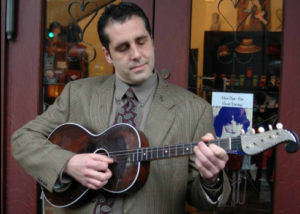
John playing brač.
As an applied ethnomusicologist, John has researched and collected numerous old songs from elders and amassed a music library of hundreds of recordings, books, sheet music and resource materials of tamburica and traditional Croatian and South Slavic folk music, dances and traditions.
Besides learning to play all the different tamburica instruments and mastering the skill of arranging in those parts, over the years he has also learned to play Slovene button accordion, lijerica (a lyra-like fiddle), and gusle (a one-stringed, bowed instrument).
John was longtime conductor and arranger for the 30-voice Jele Croatian Women’s Choir and Ženska Klapa Ružmarin, both of Vancouver, B.C., and has been a guest choreographer/music arranger for several Croatian folk ensembles in the Pacific Northwest and Western Canada. He was honored by being selected as guest conductor for a Croatian Fraternal Union Junior Cultural Federation Tamburitza Festival in 2005, conducting more than 1,000 young tamburaši.
He’s taught dance at Kolo Festival in San Francisco and taught dance or Croatian singing at many camps and seminars across the U.S., including being on the roster to teach at this year’s grand finale Mendocino Folklore Camp (the week before Balkan camp, in the same location). He has choreographed for ethnic folkdance ensembles across the U.S. and Canada.
He sits on several boards: Croatia Fest, a large public festival that takes place in Seattle in October; the Ethnic Heritage Council, which promotes communication and understanding among Seattle’s ethnic communities (not just the Balkan ones); and, along with EEFC teachers Ruth Hunter and Christos Govetas, Balkan Night Northwest, a one-night festival in Seattle that, among other things, has raised funds to send youths on scholarship to one of the EEFC Balkan Music & Dance Workshops.
In 2016, John, along with his mother and sister, was awarded the Gordon Ekvall Tracie Memorial Award for excellence in ethnic performing arts by the Ethnic Heritage Council of the Pacific Northwest. Last year he was inducted into the Tamburitza Association of America’s Tamburitza Hall of Fame.
Apart from a mostly Croatian focus, he has performed and/or recorded with local groups including Kultur Shock, Virginia Vulgaris, Children of the Revolution, Lara Lavi and Balkan Cabaret.
What’s next? Right now, the Seattle Junior Tamburitzans’ 50th anniversary celebration, coming up this September, is a burning project, followed by, in October, Croatia Fest, also in Seattle.
Thoughts on Balkan camp
“Back in the late ’80s, most of the teachers at Balkan camp were American-born,” John says. “Now we have quite a few people on the staff that are were actually born over there, in Europe. It’s a nice mix of people that are bringing new material to camp; and I’m ever inspired by the scholarship of the people that are actually doing fieldwork, that are not just listening to YouTube but actually are going over there and working with folks, collecting old songs and old dances, old tunes, learning to play those archaic instruments.
“We’ve had the opportunity to learn from so many people, and I was one of the benefactors of that,” he says. “I went to Balkan camp as a teacher, but I ended up being a student at the same time and learning not just songs and dances, but how to conduct fieldwork by their example—how to go in, who to look for, and to share that knowledge with others. I think that’s really important.
“Folk music is always evolving; it’s always changing,” he adds. “Whatever bug bites you, whatever is going to inspire you to learn, to dig a little deeper, I think is good.
[1] Tamburica or tamburitza is a family of stringed instruments and a musical style indigenous to Bosnia, Croatia, Serbia and Vojvodina. The EEFC uses the spelling “tamburica,” based on the original Bosnian/Croatian/Serbian spelling, while many groups in the U.S. prefer the spelling “tamburitza,” including the Tamburitza Association of America, the Duquesne University Tamburitzans and the Seattle Junior Tamburitzans; hence, the different spellings used in this article..
[2] The term “tambura” is used interchangeably with “tamburica” or “tamburitza” to refer to the music and instruments of this style. This can be confusing, as, at the EEFC workshops, the term “tambura” is mostly used to refer to the Bulgarian and Macedonian instruments that bear that name.
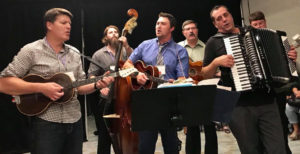
John plays accordion for this piece with Sinovi.
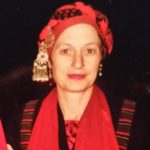
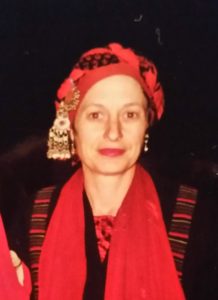
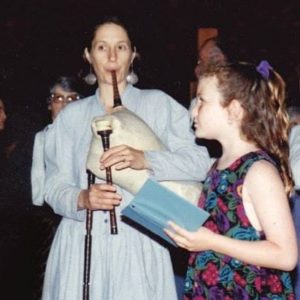





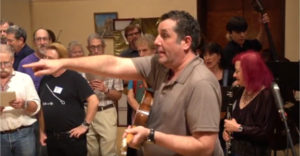


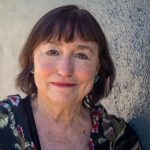
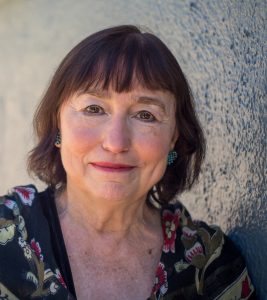 This summer’s camps are fast approaching and I’m so pleased that my sweetie Jim and I will be attending one of them (Mendocino), after a few years away.
This summer’s camps are fast approaching and I’m so pleased that my sweetie Jim and I will be attending one of them (Mendocino), after a few years away.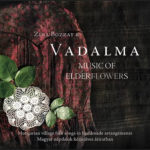
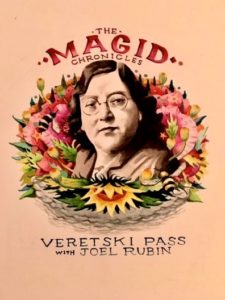
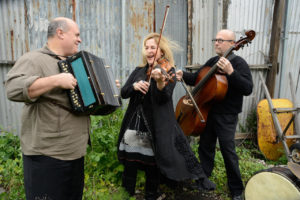
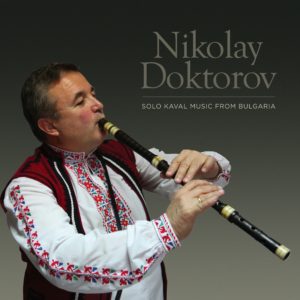
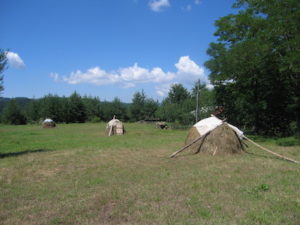
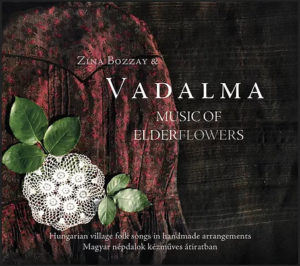

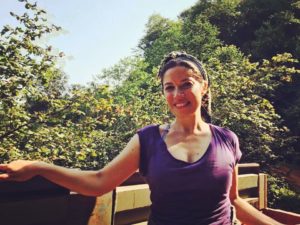
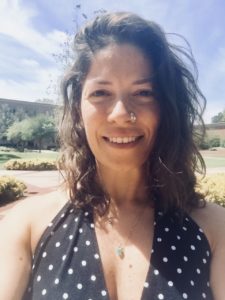
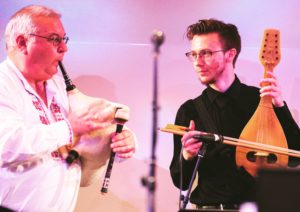
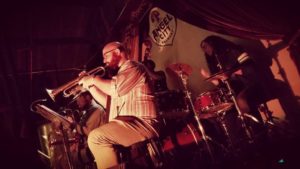
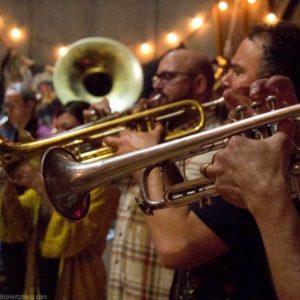
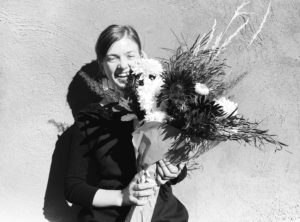
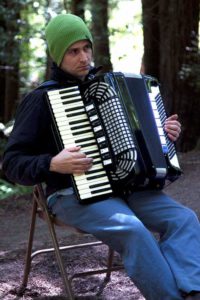
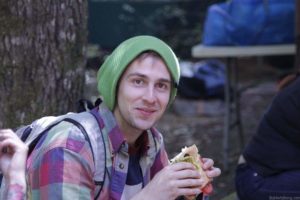
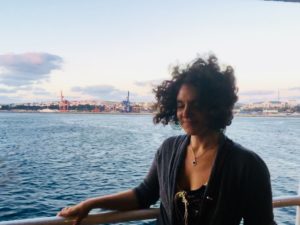
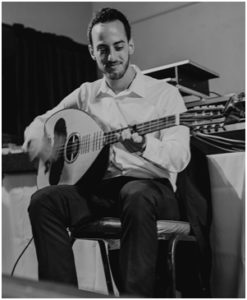
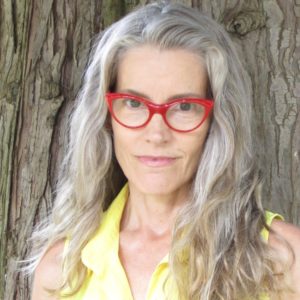
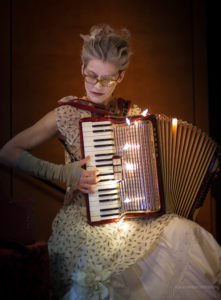
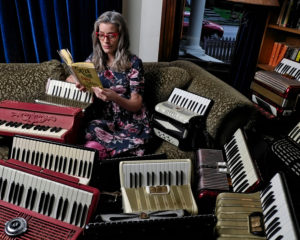
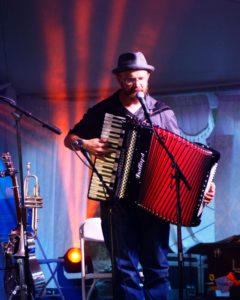
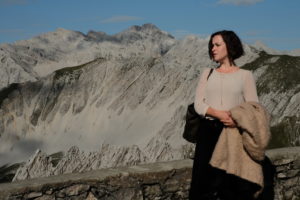
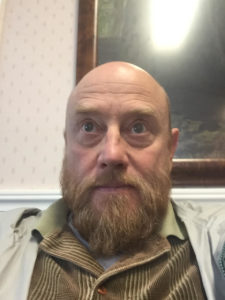
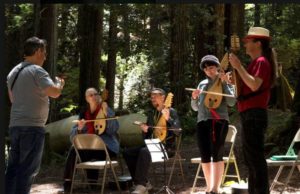
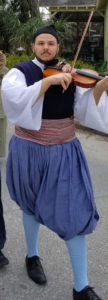
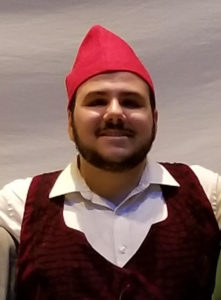
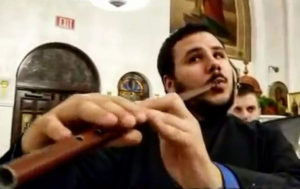
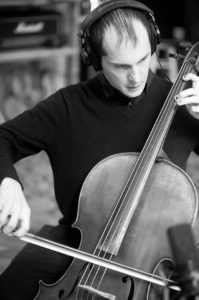
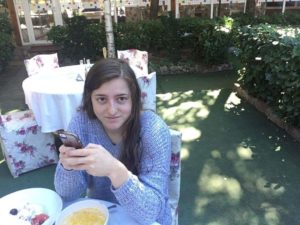
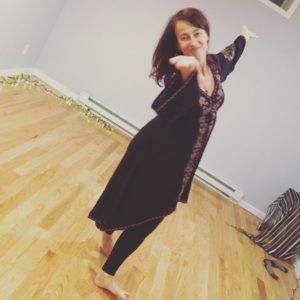
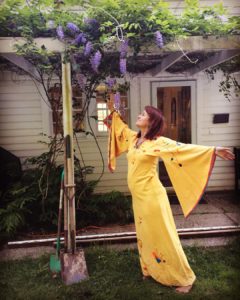 Next to me, I was holding hands with my dancing “sister” Gwyn [Peterdi] and I was so struck by how perfect the world seemed at that moment; if only our world could be held and led like this by girls, by women, by those in touch with pure delight, who sensed and understood the safety, freedom, joy and power of a spiraling dance circle. May this manifest 1000-fold.
Next to me, I was holding hands with my dancing “sister” Gwyn [Peterdi] and I was so struck by how perfect the world seemed at that moment; if only our world could be held and led like this by girls, by women, by those in touch with pure delight, who sensed and understood the safety, freedom, joy and power of a spiraling dance circle. May this manifest 1000-fold.